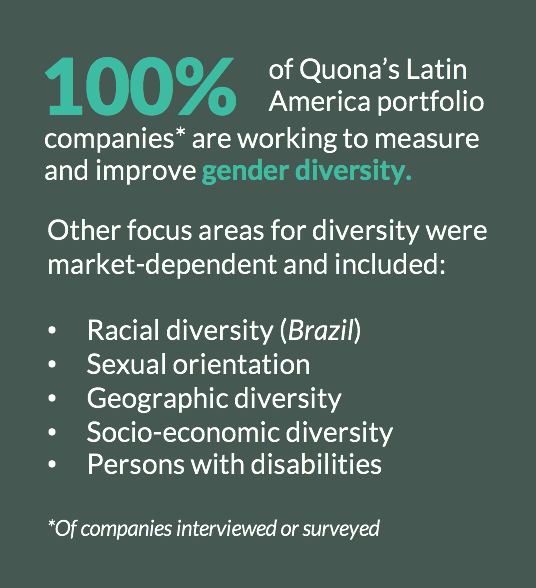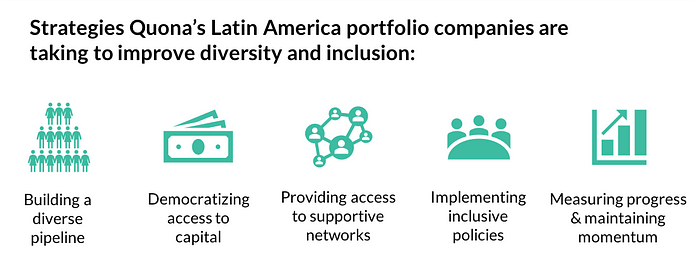
QUONA PORTFOLIO INSIGHTS
How Fintech Companies in Latin America Can Prioritize Diversity
Research by Endeavor and Mastercard— coupled with on-the-ground efforts across Quona’s Latin America tech companies — shines a light on diversity.
In the dynamic and changing workplace, diversity is still an issue that not only influences our ideas of fairness and opportunity but one that impacts performance and innovation. When it comes to diversity, Mastercard understands that all the things that make us different and similar are assets. None of us are a carbon copy of the other. Therefore, we are all diverse.
This same approach can be applied when looking at organizations. We all approach DEI a little differently and can learn from each other by collaborating and sharing best practices. Because when you surround yourself with people who don’t look like you, don’t walk like you, don’t talk like you, don’t have the same experiences as you, that’s when new ideas are sparked and innovation happens.
At Mastercard, we’re committed to fostering a diverse, equitable, and inclusive culture where the best people choose to be. We strive to create a workplace that reflects the wider world with all its variabilities. In embracing our diversity and leading with inclusion, we attract and retain the best and brightest, drive our business forward and deliver limitless possibilities in our communities. We understand there will always be more work for us to do, and we are dedicated to making progress in the right direction every day.
The examples called out in this paper highlight some of the great work that companies across Quona’s portfolio are already doing and where they are having success. I encourage you to reach out to each other to learn, share and collectively make progress both inside and outside your companies. There is so much we can learn from each other, as we continue the journey for this important work.
If you are just starting your journey, I encourage you to start small. Kick-start a conversation about diversity, equity, and inclusion in your company, identify one or two things you’d like to focus on that will make your company more diverse and inclusive, and go for it.
Not only will your employees value it, your customers will too.
Wishing you every success!
—Randall Tucker, Chief Inclusion Officer, Mastercard
Diversity and inclusion (D&I) efforts are not just the right thing to do in order to build an open and supportive company culture, they’re also crucial to the success and growth of tech businesses around the globe. Among Fortune 500 companies, those with the greatest number of women in management roles perform up to 35% better than those with lower levels of gender diversity.
Across Quona’s global portfolio and in Latin America in particular, companies have taken an active approach to increasing their diversity and inclusion efforts. Crucial to progress is a bottoms-up understanding of what diversity means across individual markets. These insights have been gleaned from close communication with CEOs and leadership across our portfolio.
What Diversity & Inclusion Means in Latin America
Latin America’s approach to diversity and inclusion has been complex and nuanced, driven by unique factors connected to particular geographies. What we’ve learned in our continuously evolving D&I conversations with companies in our portfolio is that there are some emergent themes while each geography faces its own unique challenges.
Across the region, the issue of gender inclusion has increasingly garnered attention from company leaders who believe that the underrepresentation of women in tech misses out on an important part of the labor market and an effective, empathetic connection with their end customers. Increasing the number of women in their ranks has become a particular priority, as women remain grossly underrepresented across the Latin America tech sector. Of the more than 800 companies recently surveyed by Endeavor and Mastercard for a whitepaper on bridging the gender gap within tech companies in Latin America, only 23% had at least one woman on its founding team, and only 9% had one or more all-female founders.
And yet there are some inspiring efforts. In Mexico, diversity efforts are largely focused on gender and sexual orientation, according to leadership at Klar, a Mexico City-based digital alternative to banks that, among many initiatives, has set targets to attract more women into leadership roles. In Colombia, workplace diversity, in addition to focusing on gender equality and sexual orientation, is also largely driven by socioeconomic diversity and social mobility, according to leadership at ADDI, the Colombia-based financing platform.

Racial and ethnic diversity efforts have also become more central in specific Latin American countries like Brazil, where black Brazilians made up less than 5% of the top positions of the top 500 companies despite a population that is 54% black. Brazil’s growing consciousness on race, in addition to gender, has been accelerated by global movements and is reflected in models of leadership, like Creditas, the largest leading digital credit and financial services platform in Latin America, which has developed comprehensive diversity and inclusion efforts to create a hospitable environment for talent from historically underrepresented groups.
More generally, effective practices are underway to help diversify the ranks of companies across Latin America, as research conducted by Endeavor and Mastercard underscores. Here we recap some straightforward strategies our portfolio companies in Latin America are employing to improve diversity and inclusion in their ranks.

Practical Solution: Build a diverse pipeline
Bringing more diverse talent into tech companies is an effort that requires roots in early intervention and education. According to research by the Organization for Economic Cooperation and Development, 15-year-old boys are twice as likely to pursue a career as an engineer, scientist or architect than their female counterparts. In Mastercard and Endeavor’s survey of 160 female entrepreneurs across Bogota, Mexico City, and Buenos Aires, 27% of them came from a STEM training background, compared to 53% of men in similar positions. Developing training programs for girls and women in STEM is a crucial first step in expanding the pipeline of women both entering and moving up the ranks in tech leadership roles.
Recognizing this important step in developing talent, companies across Quona’s portfolio are seeking ways to prepare more underrepresented talent for technical roles. Both Neon, a Brazil-based digital bank, and BizCapital, a digital SME working capital lender in Brazil, have partnered with software development and coding programs to either develop internal talent or expand their talent pipeline to include more diverse candidates. Similarly, Creditas is partnering with Reprograma, a women-focused coding program, with the aim of hiring at least 20 graduates from this program over the next two years.
Practical Solution: Democratize access to capital
Lack of funding for female-run tech companies (and companies in general) is a huge obstacle in closing the gender gap. In Mexico alone, the Endeavor study found that 97% of the capital raised by tech companies was directed toward businesses founded by men. In order to repair this dramatic disparity, many companies have begun to take a deliberate approach to financing outreach for female entrepreneurs.
Konfio is a Quona portfolio company that offers digital banking and software to small and medium-sized companies in Mexico. Leveraging its partnership with IDB Invest, Konfio pursued an 18-month action plan focused on increasing diversity and inclusion internally and within their target market. During 2020, 33% of the company’s disbursed loans were allocated to women-owned companies, 90% of which are sole proprietors. Konfio founder and CEO David Arana is actively seeking to expand Konfio’s impact, including women’s access to credit.
Practical Solution: Provide access to safe and supportive networks
Providing support networks and a sense of community is another crucial element to building a diverse and inclusive company ecosystem. Endeavor and Mastercard research found that 40% of surveyed female tech entrepreneurs had been subjected to some form of discrimination at work, with 97% of those cases having specifically to do with gender discrimination. For this reason, creating supportive and like-minded networks that allow women, as well as other underrepresented groups that experience similar discrimination, to feel safe and seen in their professional world is particularly important across the board at tech companies.
In response to this pressing need, companies across Quona’s portfolio — including Creditas and Neon, both based in Brazil — have prioritized developing affinity groups that give employees supportive communities to join. At Creditas, for example, affinity groups focused on Black employees, women in tech, LGBTQ individuals, and employees with disabilities have created safe environments where employees can meet and share their experiences with one another. Similarly, Neon has developed inclusion groups for women that meet monthly, each with a focus on specific challenges faced by female employees. Contabilizei, a tax filing and accounting platform also based in Brazil, has recently launched monthly, team-wide and community-driven discussions focused on promoting conversations around diversity.
Practical Solution: Implement inclusive policies
Developing company-wide policies in areas including hiring, salary, and paid time off is also crucial in building an environment that fosters greater equity. The Endeavor and Mastercard research found that because most tech companies were founded by men and designed around the needs of male employees, they often have a blind spot to many of the issues unique to female employees — namely the need for paid time off and equal salaries for male and female employees.
Across Quona’s portfolio in Latin America, companies are working to identify and eliminate bias from pay structures. At BizCapital, the board developed a People and Compensation Committee with a specific focus on discussing approaches to hiring and salary inequities. Similarly, both Konfio and Klar in Mexico have created processes to identify and address the issue of gender pay disparities and implement policies focused on building more inclusive workplaces.
Our companies are also developing clear goals around building and hiring more diverse teams. Contabilizei in Brazil is working with their recruiting team to establish quotas for diverse candidates for some roles, and has also built a robust dashboard to measure diversity across functions and levels. At Neon, an external consultant was brought in to run a blind recruitment process for the 2020 internship program. And at ADDI in Colombia, headhunters have been sometimes asked to provide five times the number of female candidates (or other represented groups) for each leadership role in an effort to increase gender diversity across leadership staff.
Practical Solution: Measure progress and maintain momentum
Key to making progress in expanding diversity across technical roles is having some system in place to maintain an understanding of what’s happening. This was underscored by Contabilizei CEO Vitor Torres, who has worked with his team to develop a robust dashboard to measure diversity across functions and levels. “We’re a technology company. If something is important, it needs to be measured,” noted Torres. Emphasis on measuring diversity is mirrored throughout Quona’s Latin America portfolio, with companies consistently assessing the elements of diversity most relevant in their markets.
“We’re a technology company. If something is important, it needs to be measured,” noted Contabilizei CEO Vitor Torres on the company’s motivation for measuring diversity.
Some companies, including Klar in Mexico, have also established an explicit set of clear company-wide objectives and key results aligned with external frameworks like the United Nations’ Women’s Empowerment Principles. Those objectives include hiring more women in technical roles, diversity training, and professional development opportunities. Similarly, Creditas and Konfio are keeping the conversation across their ranks top of mind with unconscious bias training programs.
Looking ahead
As the Endeavor and Mastercard research found, making progress on this historically challenging issue requires effort across company ranks. Across Quona’s portfolio of companies in Latin America, we see this progress taking shape through ecosystem-wide efforts. It isn’t simply how businesses are operating independently but the important partnerships and relationships they develop with other organizations like Mastercard and Quona, that are fundamental to maintaining and moving the needle on progress.
